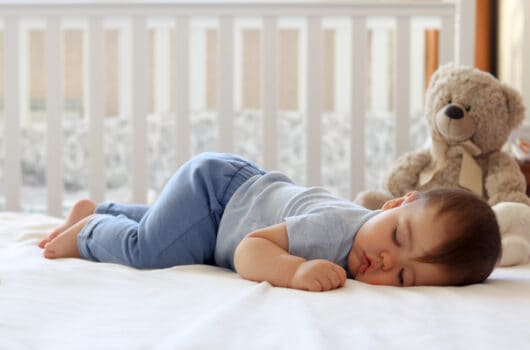Babies are the ultimate irony-merchants. They simultaneously sleep forever, while allowing you to have absolutely no sleep of your own. It’s like some sort of weird, unfunny, infuriating magic trick.
Because of that, if you’ve recently become the proud parent of a baby, you’ll definitely be sleeping too little. But if you’re concerned that your baby is sleeping too little (or too much), you might be wondering just how much sleep those little cuties need.
In this article, we’ve unpacked how much sleep babies need, sleep guidelines for different ages, and tips on how you can make sure your baby is sleeping properly. We’ve also included pointers for sleep-deprived parents keen to catch some slumber of their own.
Read on to discover how much sleep your baby really needs.
- Recommended Sleep Times for Different Baby Ages
- Why Do Babies Need So Much Sleep?
- How Can I Help My Baby Sleep Better?
- What Should I Do if My Baby Is Sleeping Too Much? or Too Little?
- Sleep and Separation Anxiety
- How Can I Get More Sleep With a Baby?
- My Babies Are All Grown-up – How Much Sleep Do Kids Need?
- Final Thoughts
Recommended Sleep Times for Different Baby Ages
Depending on how old your baby is, their sleep needs will vary accordingly, and these needs will change as your baby grows up. Here’s how much sleep your baby needs depending on how old they are:
Newborns (0-3 Months)
Newborns normally sleep for somewhere between 15-18 hours per day.
But unlike adults, this sleep is broken down into smaller chunks, rather than one long period. That’s because babies need ridiculously-regular feeding. At this age, babies just need sleep and nutrition, meaning their existence is made up of periods of sleep broken up by periods of slurping down on milk.
You’ll likely find that your baby has absolutely no habits or patterns at this point, as they haven’t yet got a handle on the concepts of night, day, routine, or the need for you to have any sleep at all. It’s unlikely that your baby will routinely sleep for more than 2 or 3 hours at a time, even at night.
But don’t worry – at around six months, it gets easier to establish sleeping routines and daily schedules (both organically and intentionally).
Infants (4-11 Months)
Infants need a little less sleep than newborns, and usually average around 12-16 hours per day. At this point, they should start sleeping a little better during the night, but it’ll by no means be an unbroken sleep. They’ll also start sleeping slightly less during the day.
As babies get older, they tend to spend more time sleeping at night, and less time sleeping during the day. This is for two reasons:
- Their need for mega-regular feeds begins to diminish
- They develop better understandings of night, day and routine as their circadian rhythms fall into place
Usually, babies start sleeping more solidly (for around 6 hours per night, or 8 if you’re lucky) at around 6 months, though it might take them up to 12 months to develop this habit.
If your baby still isn’t sleeping solidly at night after 12 months, don’t worry about it – all babies move at slightly different paces. But for those who are concerned, we’ve brought you some top tips later in this article on how you can improve your baby’s sleeping patterns and habits.
Beyond Babies (12-24 Months)
At this point, your babies are no longer babies, and they’ve probably started to grow into rebellious, tyrannical toddlers. But no matter how rebellious they may be, they still need lots of sleep, averaging around 12 hours of sleep per day.
You’ll find that napping declines a lot at this age. Around 1 or 2 naps a day is normal at this point, compared to the seemingly-perpetual napping of small babies.
How Much Sleep Do Premature Babies Need?
Premature babies need more sleep than non-premature babies.
It’s pretty common for premature babies to sleep for 18-20 hours a day, even after 3 months, but that’s not always the case.
You’ll also find that premature babies often wake up more than non-premature babies, but that’s all very normal.
If a baby has colic, they might sleep less than your average baby.
Why Do Babies Need So Much Sleep?
Babies have got a lot of growing to do. Like, a lot. They’re small.
Lots of sleep is conducive to lots of growing, as growth hormones are released during these slumbersome hours. During sleep, babies grow physically and psychologically, even learning, thinking, and developing motor skills as they snooze away. Sleep is important for many reasons, both for babies and kids.
How Can I Help My Baby Sleep Better?
Again, you should remember that different babies have different needs and sleep patterns, and some are essentially nocturnal since they aren’t born with any real sense of what night or day actually are.
So for the first few months, don’t worry about it, and don’t stress if you’re struggling to find any consistency or routine. But after about six months, you should start trying to establish patterns and routines.
To make your baby have a better sleeping pattern, here are some things you should (and shouldn’t) do:
Concentrate on Light and Dark
Adult humans associate darkness with going to sleep and light with being awake. Get your baby into that same habit. At night, offer darkness, silence and soothing sounds to get them to sleep. During periods when they should be awake, offer stimulating lights, sounds and music.
Establish Routines
Set a specific bedtime, a specific wake-up time and specific feed times. If you get these into a routine, your baby will become accustomed to them.
A wind-down routine is also important. Before bed, incorporate things such as dim lights, lullaby music, gentle singing, bathing and a soothing atmosphere. Not only will this stuff get your baby to sleep, but your baby will also learn to associate these things with impending snoozetime.
For the same reason, don’t do stimulating things with your baby close to bedtime.
Don’t Be Afraid to Wake
If you have decided to set a wake up time, whether it’s for feeding or because it’s the beginning of the day, wake your baby (gently). There’s no harm at all in doing this, so long as you’re tactful about it.
Look Out for Signs of Sleep Readiness
Learn to be perceptive, and know when your baby is sleepy. Key signs of sleepiness in babies include eye-rubbing, fussing, yawning and irritability.
Don’t Eliminate Daytime Naps
Your baby needs to sleep during the day (especially if they are very young). If you have an allocated feeding time, keep your baby awake for it, but don’t try to keep your baby awake all day.
Here are even more great tips on helping your baby to sleep.
What Should I Do if My Baby Is Sleeping Too Much? or Too Little?
If your baby’s sleeping patterns differ slightly from the above, don’t worry. All babies have different needs and different patterns, and no two babies are exactly the same.
But if your baby seems to be sleeping far too much or far too little, you might want to speak to a doctor. Before doing that, here are some things you can try:
Keep a Sleep Diary
Maybe you think your baby’s sleeping is inconsistent. But humans have a habit of remembering things wrong, so your estimations might be off. Make an actual diary of your baby’s sleep and it might help you to realize that your baby is actually sleeping more ‘normally’ than you thought.
Don’t Be Hasty
If your baby has just woken up, your instinct will be to snap into action and immediately hug them or pick them up. And though that’s natural, it’s not always healthy, as it’s encouraging your baby to rouse right out of sleep.
If you instead leave your baby for a little while, they might fall back asleep instead, and therefore learn that a temporary waking doesn’t always need to become a permanent one.
Gently Wake for Feeding
In the first 3 months of a baby’s life, food is insanely important. So if your baby is sleeping too much during this period, and not waking enough for feeding, you should gently wake them up at intervals of every 3 or 4 hours. Though you might not want to disrupt them, this feeding time is essential – and the routine you’re establishing will soon become a habit for your baby.
Again, if none of these tips help and you’re still concerned that your baby is sleeping too much or too little, speak to a doctor.
Sleep and Separation Anxiety
At around six months, you’ll probably have decided that your baby should sleep in their own room (instead of yours). For the first few days or weeks of this period, your baby will begin suffering from separation anxiety, as they won’t be accustomed to being separated from you for such a long period of time.
This period will be marked by sudden crying in the middle of the night, endless restlessness, crying when you leave the room and trouble falling asleep.
This is often a massively difficult period for many parents, but it’ll pass quicker than you think. Be strong, don’t routinely bring your baby back into your bedroom, and be stern with your routine-setting. Here are some great tips on dealing with separation anxiety both generally and at night.
How Can I Get More Sleep With a Baby?

If you’ve just had a baby and (despite all warnings) you’re surprised by just how little sleep you’re getting, here are some top tips on how you can get more sleep:
Nap
If your baby is napping, consider catching some sneaky nap time too. It seems simple, but you have to sleep when you get the chance.
Accept Help
This help might come from your partner, a friend or a family member. But whoever it comes from, a little help sometimes can get you a little sleep sometimes. There’s absolutely no harm or shame in sometimes taking a little time away from your baby.
Don’t Compromise Your Health
Don’t get hooked on caffeine or sleeping pills, and try to stay hydrated and eat lots of good food. If you can’t get good sleep, at least make sure you’re staying healthy in other ways.
Set Routines
Again, set routines. If you can get your baby into good routines, it means you’re also getting into good routines. Adults need routines even more than babies do.
My Babies Are All Grown-up – How Much Sleep Do Kids Need?

Kids also need lots of sleep. Though they don’t need as much sleep as babies, kids have lots of growing to do too. Here’s how much sleep kids need, according to how old they are:
Preschool (3-5 Years)
Around 10-12 hours a day is normal for preschoolers.
At around the age of 5, kids will stop needing frequent napping. They still might want to nap sometimes (like a lot of adults do), but around this age and beyond, there’s no longer any real need for during-the-day rest.
The School Years (6-14 Years)
At this age, kids need around 9-11 hours of sleep per night, but this number decreases as their age increases.
Once your kid hits puberty, you’ll notice that their sleeping patterns change, which might be responsible for some restlessness and difficulty falling asleep.
What you’ll mainly notice is that they’ll start getting tired around 2 hours later than they used to start getting tired. So although their need for a late night might seem like teenage rebellion, it’s actually (also) a reflection of biological changes and desires.
The Notorious Teens (14-18 Years)
Good luck getting your kids to stick to a sleeping pattern through these years. But if you can, around 9 hours a night is perfect.
After these teenage years, we move on to our adult sleep phase, where we need around 8 hours of shut-eye a night.
Final Thoughts
When it comes to sleep, babies don’t understand how precious it can be. Unfortunately, this means many sleepless nights for both you and your baby. The good news is that understanding your child’s sleep cycle doesn’t have to be difficult. Plus, the more you know, the more sleep everyone will get!
